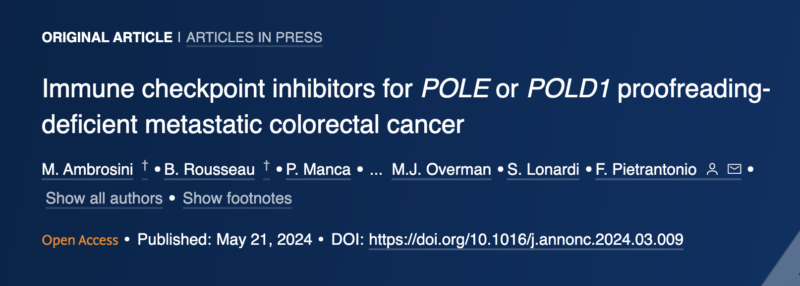
Piotr Wysocki: Patients with hypermutated colorectal cancer (POLE/D1pd) derive profound benefit from immunotherapy
Piotr Wysocki recently posted on LinkedIn:
“Ambrosini N et al. published online (Annals of Oncology) the results of a retrospective study evaluating immunotherapy (anti-PD1/anti-PD-L1 alone or combined with anti-CTLA4) in patients with metastatic colorectal cancer (mCRC) harboring POLE and POLD1 proofreading deficiency (POLE/D1pd).
The study included 27 patients with POLE/D1pd mCRC and compared their clinical outcomes with 610 dMMR/MSI-H mCRC patients treated with immunotherapy. POLE/D1pd was associated with younger age, male sex, fewer RAS/BRAF driver mutations, and predominance of right-sided colon cancers.
Compared to dMMR/MSI-H mCRC patients the POLE/D1pd mCRC patients demonstrated:
- Significantly higher ORR – 89% versus 54%; P=0.01
- Significantly superior PFS (HR=0.24, 95%CI 0.08-0.74)
- Superior OS (HR=0.38, 95%CI 0.12-1.18)
In a multivariable analysis including the type of DNA repair defect, POLE/D1pd was associated with:
- Significantly improved PFS (HR=0.17, 95%CI 0.04-0.69
- Significantly improves OS (HR=0.24, 95%CI 0.06-0.98)
- Higher tumor mutational burden (TMB) compared to dMMR/MSI-H mCRC
The results clearly show that POLE and POLD1 proofreading deficiency (POLE/D1pd) defines a rare subtype of ultramutated mCRC (>100 mut/Mb) with extremely high sensitivity to immune checkpoint inhibitors. However, current CRC diagnostics guidelines overlook this unique subpopulation of patients.”

Immune checkpoint inhibitors for POLE or POLD1 proofreading-deficient metastatic colorectal cancer
Authors: M. Ambrosini, B. Rousseau, P. Manca, O. Artz, A. Marabelle, T. André, G. Maddalena, G. Mazzoli, R. Intini, R. Cohen, A. Cercek, N.H. Segal, L. Saltz, A.M. Varghese, R. Yaeger, M. Nusrat, Z. Goldberg, G.Y. Ku, I. El Dika, O. Margalit, A. Grinshpun, P. Kasi, R. Schilsky, A. Lutfi, E. Shacham-Shmueli, M. Khan Afghan, L. Weiss, C.B. Westphalen, V. Conca, B. Decker, G. Randon, E. Elez, M. Fakih, A.B. Schrock, C. Cremolini, P. Jayachandran, M.J. Overman, S. Lonardi, F. Pietrantonio.
Source: Piotr Wysocki/LinkedIn
Piotr Wysocki leads the Clinical Oncology Department at University Hospital and the Faculty of Oncology at Jagiellonian University-Medical College in Krakow, Poland. As an advisor to the Polish Ministry of Health, he shapes the national cancer strategy.
His clinical expertise spans the systemic treatment of breast, gynecologic, and genitourinary cancers, with a focus on developing innovative metronomic chemotherapy-based therapies for advanced cancer patients who have undergone prior treatment.
Read other posts by Piotr Wysocki published on OncoDaily.
